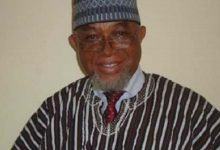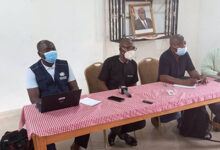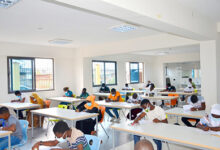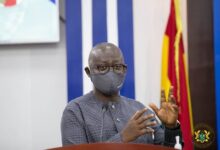The Sustainable Development Goals (SDGs) Graduate School ‘Performing Sustainability which is made up of three universities from three countries have held a roundtable discussion as part of its fifth bi-annual workshop on the use of artists in national development and transformation.
The three institutions are: the University of Hildesheim (Germany), University of Maiduguri (Nigeria) and the University of Cape Coast (Ghana) with support from DAAD-.
The workshop was on the theme “The role of artists in the process of transformation” and formed part of activities aimed at deepening understanding on the use of artists in national transformation.
The Sustainable Development Goals (SDGs) Graduate School is a collaborative DAAD-funded project focusing on the overlapping areas of culture, performance and sustainable development, carried out jointly by the three universities.
During the discussion, the panellists advocated that the country should put in place pragmatic steps by way of streamlining policies relating to the culture and creative arts industry as they are key towards the nation’s transformation agenda.
They explained that, the arts are critical towards the socio-economic development of the nation and should not be taken for granted.
“We need to take a second look at our cultural policies and consider ways and how it will directly affect the local artists,” they stressed.
The panellist include Jason Otoo, dance practitioner and a chronographer; Elikplim Ayikoe, musician; Dorothea Lubbe, a German theatre director; Christoph Mataener, a German musician and Akosua Abdallah, a Ghanaian theatre practitioner.
They believed that the Culture and Performing Arts industry would be better if it was separated from the Tourism Ministry.
According to them, culture and creative arts had a functional role in the Ghanaian society and therefore should not be reduced to just entertainment.
Professor Wolfgang Schneider, the UNESCO Chair in Cultural Policy for the Arts in Development, University of Hildesheim, Germany, in his remarks, stated the need for an enhanced capacity building and infrastructure of cultures in the country.
He said Ghana had ratified the United Nations Educational, Scientific and Cultural Organisation (UNESCO) conventions on Cultural Diversity and it was critical for the nation to put in place adequate structures which would make it possible for arts to be well known in schools and in communities.
Additionally, he urged the government to build more theatres, explaining that, it would help create performance spaces for new artists to perform and also build their confidence and capacities.
Prof. Schneider further called for the formulation policies that would facilitate the cultural framework of the nation.
An artist, Elikplim Ayikoe, in his statement, appealed to the government to involve artists in the formulation of policies that affected them and not rely on people outside the industry alone.
“We are artists and we understand the art, we know what it takes to create the art. Involve artists in the formulation of policies,” he said.
For her part, Akosua Abdallah, a Ghanaian theatre practitioner, reiterated the unique role creative arts have played and continues to play in creating awareness and educating people on issues of national importance towards peaceful co-existence and development.
From David O. Yarboi-Tetteh, Cape Coast




